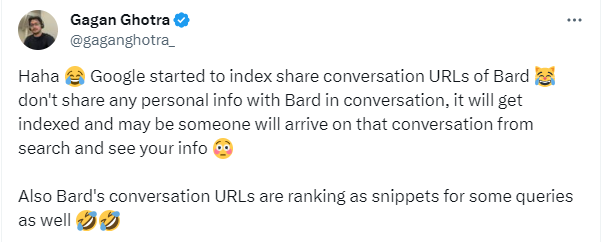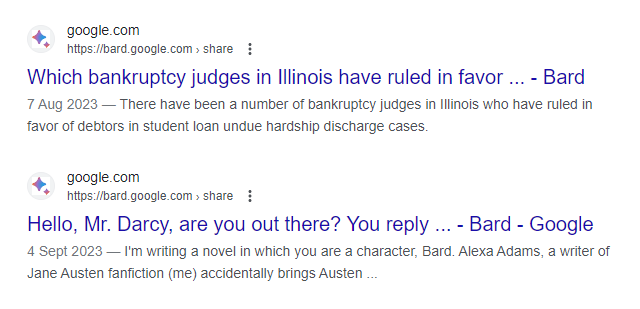
Google’s Bard conversations turn up in search results
Google is coming under scrutiny after people discovered transcripts of conversations with its AI chatbot Bard are being indexed in Google search results.
Bard is Google’s answer to ChatGPT, and allows users to have conversations with an AI. Services like these have attracted a lot of attention, because with a bit of tweaking and getting used to they can be really helpful in speeding up tasks. However, many are worried about the security and privacy implications of using services like Bard and ChatGPT.
As an illustration of why people might be worried, after an update to Bard, users found Google Search had begun to index shared Bard conversational links into its search results pages.

“Haha Google started to index share conversation URLs of Bard don’t share any personal info with Bard in conversation, it will get indexed and may be someone will arrive on that conversation from search and see your info Also Bard’s conversation URLs are ranking as snippets for some queries as well”
As it turns out, this happens only if the user chooses to share the conversational link with someone. That means that if you share your Bard conversation with a co-worker or relative by sending them the link, your conversation can be scraped by Google’s crawler. And when they’re scraped by the crawler then—you’ve guessed it—they show up as search results, spilling information you never meant to make public.
If you are curious and want to have a peek at the sort of conversations that have been scraped, you can type ‘site:bard.google.com/share‘ into the Google Search bar and hit enter. At the time of writing I got 464 results, some of which really don’t look as if they were intended to be public knowledge.

Google says that sharing chats with Search was an accident and is currently working on a fix:
“Bard allows people to share chats, if they choose. We also don’t intend for these shared chats to be indexed by Google Search. We’re working on blocking them from being indexed now.”
For those that actually find damaging content in the search results, you can file a removal request with Google.
ThreatDown EDR and MDR removes all remnants of ransomware and prevents you from getting reinfected. Want to learn more about how we can help protect your business? Get a quote.



